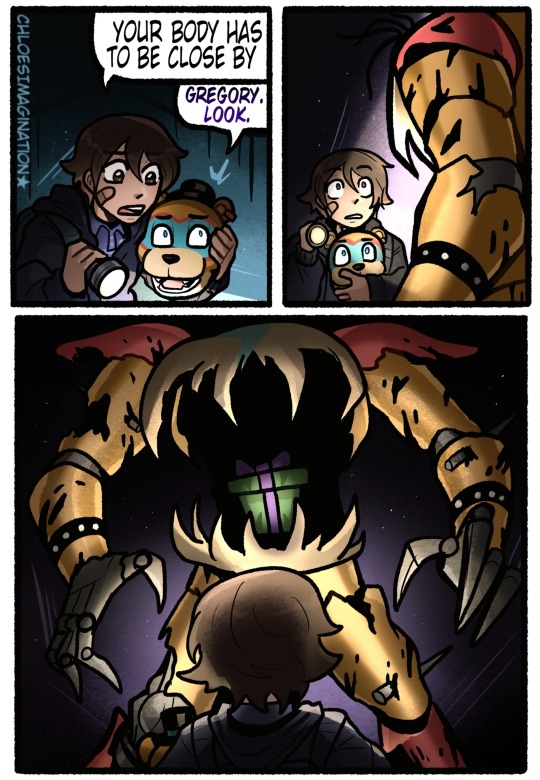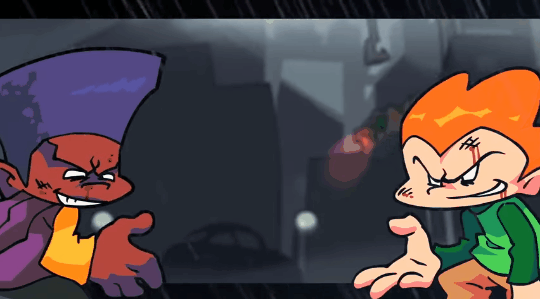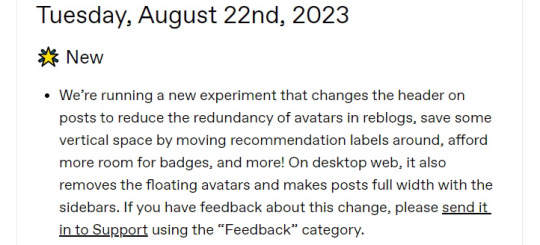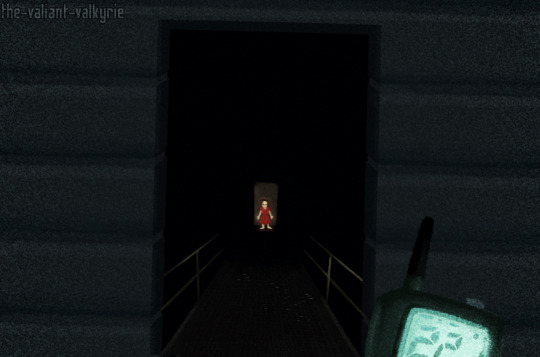#updated to be fixed maybe???
Explore tagged Tumblr posts
Text
This is so amazing that, through the miracle of Google Lens (and, okay, a fair amount of boggling at the limitations of Tumblr's lack of support for basic HTML), I present:
An accessible text-only version of the slides, with image descriptions!
(edit: Tumblr has decided to eat the indents on the bulleted lists! I have added → to indicate that certain bullets are meant to be indented from others! WTF Tumblr!?!?! I'm very sorry to screen reader users who now may have to listen to multiple "right arrow right arrow" in some spots (and if there's something better I can do, please let me know). However since the formatting was fucked anyway I've added a readmore, at least.)
Unfortunately, Tumblr's formatting is so fragile * that I cannot insert a readmore without everything going to heck. I'm very sorry if you don't have "collapse long posts" enabled.
(* If you saw me post this before, no you didn't.)
Start of description:
Slide 1
how to make small talk with patients (and maybe other people too)
or like methods that i've developed and work well for me on average, but ultimately there are no universals in human relations, but i do think these are useful if you don't know where to start
Slide 2
also some of this powerpoint is about conversation in general, some is more specifically about nursing stuff
Slide 3
Most people also want this interaction to go well.
Slide 4
General Principles for Prolonged Small Talk with a Stranger
offer multiple conversational branches
follow patient's lead
ask open-ended questions
proportional conversation contributions
→ 1:3 ratio of talking to listening for customer service
→ personal: equal time speaking or opportunities to speak for all participants
learn to read the room
get personal but not intimate
have anecdotes and phrases ready to go
practice difficult conversations in advance
give it three shots then stop
know your exit strategies
Slide 5
important!! care about the conversation
I'm presenting a bunch of formulas here, but I want to make clear: my interactions are genuine. This is a way of thinking about conversations. All dialogue written here is the gist of what I'm saying. You still (and must!) engage sincerely, in your own voice, and with interest in the other person's thoughts. This is scaffolding you can build a conversation on.
If conversation is a dance, this presentation is explaining the steps of a waltz. You practice those foot diagram movements so you can use them in action. The dance is all in doing the dance.
Slide 6
Small Talk as Nursing Tool
Conversation as Assessment Tool
How are they talking? Slurring, raspy, very very softly, etc.
Do the words form coherent sentences?
Is what they're saying logical? Relevant?
How well can the patient describe their situation: illness, treatment, effects?
What can the patient reliably self-report?
→ capacity: what can patient perceive?
→ expression: what will the patient tell you?
Getting a feel for this patient's way of talking early on helps you detect trends or changes, especially neuro
Conversation to Build Rapport
Forming a good working relationship at the beginning of shift sets good tone.
It is easier deescalate a behavioral situation if you have already established familiarity.
Demonstrating that you're available and responsive to a patient shows they don't have to act out in order to get your attention.
Patients that are comfortable with you are more likely to tell you about subtle changes they might otherwise disregard.
Helps manage patients who talk a LOT
→ This bullet point got really long, so now it has its own slide later
Slide 7
The goal of making conversation as an assessment tool is to gather information about how the patient is experiencing their illness. You can learn about any progress, what the patient views as the most important parts of their hospitalization, and identify needs to address to customize your care plan to this patient's current condition.
Image:
Branching diagram in which
How are you feeling today?
leads to two paths
"I'm feeling [positive emotion]"
(response) "That's great! What happened?"
"I'm feeling [negative emotion]"
(response) "I'm sorry to hear that. What happened?"
text at bottom:
in both cases, you are soliciting further information with an open ended question
Slide 8
What do I talk about when I don't know what questions to ask someone?
the goal is to introduce a topic that both of you have are equally qualified to talk about, typically with the same level of investment, then in the course of talking about the general topic, you find something more specific to follow up on
basic general small talk: weather, traffic, view out of the window, what's on TV (DON'T DO THIS YET WITH THE NEWS), something innocuous happening right now, hospital beds and other amenities, animals and pets, sports
→ pursue whatever provokes enthusiasm
take the general down to the specific
→ weather happens → you talk about this weather → you talk about how it compares to other weather → you talk about how weather has affected your [wedding, sports game, air conditionless bedroom, commute to work, etc--identify your go-to anecdote.]
patient describes symptom → ask how it has been affecting their life
→ they mention a hobby it interferes with → ask about that hobby
patient mentions aspect of their life (job, birthplace, hobby, etc) → say something related to that
→ patient mentions being in the military → you: oh my mom was a military brat, did you have to move a lot?
→ patient mentions the field they work in → you: what's that? [you will learn about the wildest jobs this way]
→ patient mentions interest they have → you: wow that sounds really cool, what do you like best about that?
Slide 9
Aim for Personal, not Intimate
While you both are trying to figure out where the conversation goes, you're aiming for a controlled level of vulnerability: more than a completely "just the facts" professional exchange, less than "I've NEVER told anyone this before."
Reminder: Talking to another person involves vulnerability and risk. (That's why good conversations feel so fun!) Even with generic and uncontroversial topics, someone might accidentally go deeper than they meant, maybe even accidentally hurt someone. Don't linger anywhere you don't want to stay. It's okay to make it obvious you are changing the topic.
Personal
I went to school at [place]. It was not a great time and honestly I do not miss it. Where'd you go?
Intimate
I had a complete mental breakdown in college. At one point, all I did was lie around, smoke weed, and think about dying. It's amazing to me that I made it out at all.
Personal
How are you feeling about retirement?
Intimate
Do you worry that you wasted your life?
Reminder: just because you're comfortable sharing something intimate doesn't mean that the other person is comfortable being on the other side of that. Especially when you are providing care for them and you say something that makes them feel like they need to be responsible for your feelings. Assume intimacy is earned very slowly.
Slide 10
Levels of conversational intimacy
This slide is a flowchart, which begins by stating:
by talking about something personal and superfluous about yourself, you signal that you are open to conversation
Example:
I always wanted cats but I couldn't get until I moved out here a few years back.
Potential responses:
Pets: "oh how many"/ "what breed" / "here's my cat" Pet havers love pets.
Location: they ask "oh, where from?"
If "Pets":
Their pets
→ How are they doing while you're in the hospital? (note: natural way to learn more about their hospitalization)
→ What breed/how old/how big/wow what's it like having a snake
Your pets
If "Location":
Moving here from away
→ Where they/you lived
→ Why they/you moved here
Living here now
→ Ask about place's history
→ Ask for location recommendations
Flowchart notes:
Gradual increase in specificity. More specific = more personal
fun fact! you don't have to have a pet to talk about pets. You can talk about pets you once had, pets you'd like to have, other people's pets in your life, and/or why you don't have a pet (work too much, just don't want one, whatever). Then ask about theirs!
Slide 11
CAVEAT: SOMETIMES YOU'RE GONNA ACCIDENTALLY ASK ABOUT PETS WHO IT TURNS OUT ARE DEAD.
if you don't want to go further on this topic, acknowledge and pivot topics
→ acknowledge example: "I'm so sorry, losing a pet is hard"
→ pivot example: "Did you always have dogs?"
→ good bridge from acknowledging to pivot can pointing out you are changing the topic
→ → "I can't even talk about losing a pet, it bums me out so much."
→ → "I'm so sorry, we can talk about something else."
to see if they want to talk about it, gently probe (this signals you're open to this topic.)
→ "oh no, I'm sorry. how old were they/how long ago was that?"
→ "That's so hard. I remember when I lost [pet], I was so sad I said I'd never get [another pet] again."
if they continue the topic, they usually want to talk about their dead pet
→ Ask neutral to positive general questions
→ → "What were they like?"
→ → "How did you get them?"
→ → "That's a cute name. How'd you pick that?"
→ Talk about the pet's death ONLY IF they mention multiple times that their pet died.
→ → This looks like them discussing the grieving process, the actual event, going into details about what the death and dying process was like.
→ → → Rule of thumb:
→ → → → Multi-sentence answer = probably okay to continue this line of conversation
→ → → → One word answer = bail. new topic.
again, none of this is universal, this is my experience, everyone expresses grief differently, but I've found this to be a good approach for talking about the topic with someone you don't know well.
this also works for talking about dead human people. maybe don't ask about their breed.
Slide 12
You can draw attention to different parts of the same info to steer conversation. Pick your focus.
Example: You broke up with your partner last month, you're doing better but don't want to talk about it, and to distract yourself while heartbroken, you picked up a hobby. Someone you haven't seen in a while asks what's going on in your life:
"I just broke up with my boyfriend."
→ there's no alternate option offered except the boyfriend and the break up
"I'm thinking about starting to date again, but god, it's such a hassle."/ "Been redecorating the apartment. I've never lived alone before, it's a little nerve wracking."
→ your personal life is up for discussion but with a focus on the future, not the past
"I've gotten hardcore into knitting this month. Look at this terrible scarf." / "Nothing interesting. What about you?
→ what if we talked about anything else
Example: Patient with a Gl bleed wants the bed alarm * off.
(* I've actually got a lot of feelings about the lack of actual evidence that bed alarms prevent falls & the way they contribute to our patients' immobility but that's a different ppt & i'm trying to stay on topic A LITTLE.)
"Even if you feel steady now, there's a decent chance you could keep losing blood. You get up, get woozy, and fall without bracing yourself at all, and you've got a Gl bleed and a broken jaw."
→ provides medical reason & its effect on patient
"You'll get cleared to be independent when your condition stabilizes. Right now, if you get up on your own and fall, I guarantee you that bed alarm is NEVER going to be discontinued."
→ addresses a consequence pt might value most
"I know it's super annoying, but it's hospital policy for the first day. My nurse manager will kill me if I turn that off now."
→ I actually hate "hospital policy" as a primary reason, but there are patients out there who 1) really respect rules and/or 2) understand how managers work.
Slide 13
People are not Actually Very Good at Articulating Stuff
Some patients are more direct about their needs than others. For example, these ones don't say, "I'm in pain and would like my medication." Instead: "What is this bed made of, my ass is killing me," or "oh I can't complain I guess," or "fuck you fuck you fuck you, get the hell out of my room."
Things to consider:
IMPORTANT: people can express genuine needs in frightening, annoying, confusing, exhausting ways. Don't deny something someone needs because of the way they showed that they needed it.
Shame
→ people can feel embarrassed/ashamed of being sick or needing help
→ → the loss of autonomy and privacy
→ → especially stigmatized diseases or diseases that patients "did to themselves" (diabetes II, drug use, liver problems related to excessive drinking, complications of suicide attempts, etc)
→ → might lash out at people who provoke that shame
→ → some patients won't endorse pain but will endorse "discomfort."
Recent events
→ a patient who had a security incident today because their mom brought them meth
→ a patient who got a diagnosis today that's one of those life-defining ones
→ a patient with 10/10 pain who has waited ten minutes for someone to answer the call light
Slide 14
More Unspoken Factors
Physical condition
→ how much has the patient slept? when was the last time they ate? what is their pain level? etc
→ how difficult is it for them to eat, go to the bathroom, and turn in bed?
→ → some patients won't ask for help with something because doing it is so uncomfortable
→ → → ex. patient at risk for bed sores refuses repositioning. Why? Pain? Wakes them up? Don't understand why we do this? People do it too fast? Ask!
Time in Hospital
→ what is the relationship between the patient and the floor/careteam they have?
→ → is the patient generally liked?
→ → → if the answer is no, why does staff not like this patient?
→ → → what are possible explanations for those actions?
→ → → how does it affect their patient care?
→ → → has security ever been called? for what?
→ → is the patient part of a marginalized group?
→ → acting like you expect someone to behave badly automatically creates a hostile tone
→ → do they have visitors? are they bored? what entertainment options do they have?
→ → is their room nice to be in? (clean, not smelly, no annoying alarms, stuff in reach)
→ → the bed sucks. how much does it suck?
Slide 15
Expecting a fight can get you a fight.
you don't match their energy, you engage with the energy you want this conversation to have
you can be prepared to deal with unacceptable behavior without expecting that behavior
people get sooooooooo thrown off when you don't get mad back
allow people the opportunity to surprise you
consider your goal in this conversation: is the most important thing for you to be right?
Image: the following three sentences arranged in a circle of arrows that each lead to the next:
You think someone's an asshole so now every intervention with them is a conversation with an asshole.
Other person gets mad at being talked to like they're irrational or stupid or inherently violent so now they act like an asshole
Both of you now believe the other person is an asshole
Slide 16
useful starting points and what I do with them
people can often tell they are being treated different, even if they don't know how. acknowledging behavior is better than ignoring (and resenting) it
→ "So it sounds like from report that today didn't go great. What happened?"
→ "When you yell like that or throw something, I have to leave until you've calmed down."
→ "You shouldn't have been treated like that, and I'm sorry you were."
→ → don't automatically take the side of the hospital--trust me, staff provokes or exacerbates situations ALL THE TIME
sometimes people don't know the rules and expectations, even ones you find obvious
→ do they know they're being too loud? do they know what to hit their call light for? do they know how their meds work and when they get them? do they know when to expect vital signs? do they know why there's a bed alarm?
people generally like it when you acknowledge that things suck and when you try to do something about that
→ "That's rough, buddy." (sincere)
→ I had a patient once who was in 10/10 pain all night long, and through hard work and a lot of tries, I managed to do absolutely nothing to bring that pain down. When I went to say goodbye to her at end of shift, I said, "I'm sorry that tonight was so hard. I've documented everything we did and how it didn't work. Day shift's been told everything and will work with your doctors."
→ → and she said, "I felt better seeing how much you did and knowing that you cared."
→ → and it made me cry! and then incorporate what she said into my nursing philosophy.
Slide 17
MOST CONVERSATIONS ARE THE SAME
I've had public facing jobs my entire working career. For any given position, like 90% of what people ask and talk about are going to be the basically the same, just in different fonts.
learn the most common interactions at your job
→ what always needs to be explained?
→ what always needs to be responded to?
→ what always needs to be said?
identify the best ways you've responded to these questions
→ see what other people do, steal what works
→ identify what works best
→ → what education explanation is the clearest?
→ → what topics prompt the best conversations?
→ → what questions get you good answers?
→ → what work-appropriate anecdotes get the best response?
→ → what makes you and your conversation partner feel productive and comfortable?
→ make templates for yourself for standard conversations
→ practice new responses to see what works best for you
Slide 18
Difficult Conversations (variations on saying, "no, that's not gonna happen")
Do you even need to have this conversation?
→ patients have the right to refuse care, and the right to be involved and aware of their care.
→ Do you have any rationale beyond policy, convenience, or your personal discomfort? kill the cop in your head
→ → examine what you find uncomfortable versus unsafe
When you do have to have these conversations:
→ don't attack, don't defend. state facts, not interpretations.
→ make sure patient knows why this matters TO THEM and what happens TO THEM if nothing changes
→ make sure it is a conversation--ask the patient why this is happening and what would help.
→ listen to the patient. don't argue.
→ → make sure you understand what they're saying
→ → there's a real power in letting people rant
→ respect their decisions, protect their autonomy, believe that they think and act as complexly as you do
example: unhoused patients often deal with food insecurity. They may hoard food in their room or request a lot of snacks and meals they may not eat.
let them! who cares?
if there's dietary restrictions ordered for health reasons, explain to them why and, if possible, seek alternatives.
→ "the reason you can't eat or drink before surgery because sometimes people throw up under anesthesia and choke on whatever was in their stomach. so if you eat, they will cancel the surgery, and you'll have to keep waiting."
if they are requesting enough food that it impacts other patients, try to let them know before they hit that point.
→ "Head's up, we're running low on pudding so you can only get one more cup tonight. You wanna hold off or have it now?"
if the food has gone bad, offer replacements
→ "I'll swap that milk out for a fresh one."
→ "i'm worried that by this point, this food has been sitting out so long, it will make you sick. what else can i get you for you to have at your bedside?"
Slide 19
SOME PHRASES I HAVE ON LOCK
Sometimes someone will say something to you that, for whatever reason, you are utterly unprepared to answer. Practice some generally applicable statements to say in these moments avoid saying something you don't mean out of on the spot panic. (Don't worry about creativity. Sometimes, you simply must embrace cliche.) This can be especially useful if you don't typically have patients in psychosis or with delusions.
Wow, that sounds really [adjective] to deal with.
→ this is the best and easiest catch all. you're acknowledging what they just said without endorsing it, denying it, really expressing any opinion except that something has impacted the patient telling you this. And it's true. That situation IS really [adjective] to deal with.
I don't think we agree on this topic.
→ good for politics
I find what you said hard to believe based on the evidence I have.
→ if patient with delusion really presses you for your opinion on whatever the delusion is
→ always allow for the possibility that they're right
I want to make sure I'm giving you the right answer, so let me go doublecheck before I answer.
→ good when the patient asks a question about care and you're like "HUH. UHHHΗΗΗΗΗ."
I'm sorry. I know this isn't what you wanted to happen.
Slide 20
Help, This Old Man Will Not Stop Telling Me About His Entire Fifty Year Career: Dealing with Talkers
Definition of "talkers":
→ you're told first thing in report that they talk a lot
→ they resist all signals that you'd like to leave now
→ your participation in the conversation is optional: they will just monologue at you
→ often frequently hitting the call light for small requests that they will not cluster together
→ → i.e. getting them their sleep meds, a cup of tea, and a warm blanket will be three separate calls five minutes apart, despite the patient assuring you every time that they can't think of anything else they could need.
Seek conversation with these patients purposefully
→ You are not going to avoid conversation with this patient. It simply won't happen.
→ Staff starts dodging interactions with this patient, leading to the patient calling more and wanting to talk even longer when someone does come
→ → you MUST break this cycle
Invest a specific amount of time to be genuinely engaged in talking with them
→ I will schedule conversation w very high need patients like it is wound care or another procedure.
→ Patients like talking to someone who is not running out the door. Getting undivided attention often calms the desperation to talk.
→ Can make easier to get out of the room faster in the future. They know you'd stay and talk if you could. (And you feel less guilty about dipping.)
Slide 21
HOW TO EXIT A CONVERSATION THAT WON'T END
There's always going to be someone that's like "oh just leave." If I was confident enough to just leave, I wouldn't be making a powerpoint presentation about how to talk. Here are some tricks to derail the monologue and remind everyone of the world outside this room:
Make clear when you arrive how long you can stay. That makes it easier to look at the clock and go, "oh shoot, I gotta run."
→ variation: set a timer on your phone to go off loudly. When it does, say, "I've gotta go check on something."
Have a buddy. Tell them if you don't come out of room 314 in ten minutes to come knock on the door and tell you a doctor is on the phone.
If you have a vocera or other communication device, you might be able to schedule a voice reminder. Patients understand you have to go when your pager equivalent dings.
Say you have to give pain or nausea meds to someone else. Now you sound like a bad nurse if you don't leave.
When all else fails, you just have to go, "Well, I'm gonna leave now, see you in an hour," as you are actively walking out the door.
Slide 22
FIGURING OUT WHEN IT'D ACTUALLY BE REALLY ANNOYING FOR YOU TO TALK
Sometimes patients hold you hostage in endless conversation. Sometimes you're trapping them, and they have much less of an ability to just leave. A lot of patients want peace and quiet; a lot of patients really jump at the chance to talk to someone if given an opportunity. Try three times and see the response.
(1) Overture -- couple sentences in first part of the shift that contains details that are that not essential for practicality and allow for follow up questions.
Overture: "Do you want me to adjust the lights? I love that there's a dimmer switch in this room. This is the only floor I float to that has so many lighting options. Well, this one and maternity."
Every other time I'd ask this question: "Lights on, off, whadya want?"
(2) Question -- ask a question about them that is related to care but not purely medical.
"How have you been sleeping?"/"How have you been eating?"
"Was that your family in here earlier?"
"Oh hey, you transferred here from [x]? That's a long way, how'd they bring you here?"
"Is there anything else I can get you? Do you do word searches or sudoku, anything I can print out for you?"
(3) Follow up once do one more of the two things listed above.
This is for the people that need a little warm up.
If they don't respond meaningfully to any of these three attempts, stick to the strictly professional.
Slide 23
ONE LAST DISCLAIMER BEFORE WE GO
this is stuff that generally works for me, someone who made a powerpoint on minmaxing chit chat. so, yknow. interpret that as you will.
these "rules" are more conservative and rigid than they have to be
→ there's a lot of flexibility and grace in actual conversation. But if you feel like you don't have an ear for the rhythm and content of small talk, it's nice to have structure while you practice.
again: NONE of this means I don't care about a conversation or everything is a formula. everything here is something that's helped me be less anxious about conversations, to improve the conversations I have, and to reduce my mental load so I can enjoy conversations. It's fun to talk to people!
→ I cannot tell you the amount of staggeringly intimate conversations patients have had with me in the middle of the night because I make it clear that I'll listen nonjudgmentally. It is my favorite part of the job and some of the most important care I can provide.
Slide 24
BONUS SECTION: EMPATHY
I have no idea what's obvious to people or not. Here's how I approximate what someone else might be feeling in in situations I've never experienced.
Slide 25
EMPATHY EQUATION because sometimes people don't tell you what they feel or they don't know themselves or they don't know what to ask for in this situation so you have to make a guess.
Break down the situation to its core.
Identify a similar experience I've had.
Identify what I wanted in my similar experience.
Break down I would have wanted down its core.
Adjust for magnitude of the situation.
Apply context specific variables.
See if I can find a way in current circumstances to express the core of what I would have wanted.
Slide 26
Example: Patient who habitually uses fentanyl and meth is admitted for an infected leg wound and grows angry they aren't getting more opioids.
(1) Break down the situation to its core.
patient is in distress
patient perceives that the thing that would relieve that distress is being denied to him by people who could provide it
(2) Identify similar experiences I've had.
miserably enduring earaches as a child
being unable to get my adderall filled and feeling angry that I had to chase down my meds
(3) Identify specifically what I wanted in my similar experience.
my earache to stop
to just get sleep so I didn't have to deal with this
to get my adderall so I didn't feel so concerned with rationing the remaining pills
for people to not treat my problem as meaningless or even an annoyance to them
(4) Break down those wants to their core
pain relief
rest and recovery of my body
reliable access to my medication
respect and compassion
Slide 27
Empathy Example, continued
(5) Adjust for magnitude of the situation.
infected leg wound is much more painful than an earache
(6) Apply context specific variables.
people who use drugs are often shamed for it
patient at baseline tolerates and is used to a very high level of opioids
people don't tend to abuse fentanyl when their life is going well
patient has a new pain on top of chronic condition managed by habitual drug use
(7) See if I can find a way in current circumstances to express the core of what I would have wanted.
pursue multimodal methods of pain relief (tylenol, ice, muscle relaxers, elevation, ice packs, distraction, meds for other symptoms)
prioritize protecting sleep (limit awakenings, cluster care, prioritize your interventions and assessments, etc) and promoting comfort (more pillows, warm blanket, hot chocolate, hospital mocktail, making the room smell better, turning off lights shining directly in patient's eyes)
reach out to doctor about pain management plan, advocate for more opioids if that is indicated (in this example, almost certainly is). sometimes more opioids up front to decrease pain means less opioids overall bc now you're in maintenance mode, not crisis mode. get patient as consistent a pain med schedule as I can so they know when they can expect medication and what it will be. develop plan with patient about when they want to be woken up for meds.
tell the patient what you're doing and what you'll do next if that doesn't work. tell them that you're sorry they are in so much pain and you are trying to improve the situation. proactively round on them to assess progress of your interventions. it is distressing and hurtful to be in pain and feel that no one even cares enough to give you better treatment than you'd get leaving AMA and self-medicating.
No Deep Conversations When Someone Is Still Yelling
Later when things are calmer and you have a better relationship, you can debrief with the patient about what happened. Ask the patient what they were feeling and what would help in the future, while being realistic about what you can and can't promise. While in crisis, keep sentences short, calm, and practical. Focus on taking actions that address the core needs.
End of description.
One of the stranger things about training brand new nurses is explaining how to min max small talk. It feels very weird to coach people on how to chat.
#described#advice#small talk#seriously tumblr how do you not support list type#and what on earth did you upon my hitting post#mine-ish#updated to be fixed maybe???
48K notes
·
View notes
Text

If Gregory experienced FNAF ruin…
#myart#chloesimagination#comic#five nights at freddy's#fnaf fanart#gregory fnaf#glamrock freddy#fnaf ruin#security breach#Imma be so fr the ruin Freddy design is super cool#I love how the chest is all ripped open to look like teeth#it remind me of the monster house a ton actually#the idea of Gregory going back to the pizzaplex to look for Freddy’s body#to maybe fix him#and coming face to face with this instead#so spooky..#I hope we do eventually get updates on Gregory Freddy etc#super curious where they are at rn in the story
4K notes
·
View notes
Text
Clouds of doubt depart, moonlight amidst dreams unveiled, to grace dreamers' hearts.

"Hmm, how to describe this old friend of mine... Well, she's an intriguing one, but 'cute' isn't exactly the word I'd go for. Being the finest clinical psychologist in all of Inazuma, she has a remarkable talent for reading others' minds. Yet when it comes to her own, she keeps it so tightly sealed that even I struggle to fathom what she's thinking. If you ever have the pleasure of meeting her, why don't you try guessing for yourself?"
— Yae Miko
◆ Name: Yumemizuki Mizuki
◆ Title: Embrace of Enchanting Dreams
◆ Clinical Psychologist and Major Shareholder of Aisa Bathhouse
◆ Vision: Anemo
◆ Constellation: Tapirus Somniator

According to ancient Inazuman folk tales, as the day wanes and eyelids grow heavy, if you're very lucky, you might just catch a glimpse of a yumekui-baku — a kind of youkai that can slip into your dreams and devour the nightmares that prey upon your slumber.
Household figures from the world of lore and legend, these youkai gradually sought to carve out a place for themselves within human society. When the Aisa Bathhouse reopened with fresh funding, a group of yumekui-baku — having taken on the form of human girls — stepped forth into the public eye as clinical psychologists.
Yet without a shadow of a doubt, there is one who stands out above all the rest, and her name is Yumemizuki Mizuki. Somehow, even when treating the most despondent of clients, she always manages to help them discover a newfound sense of happiness. Within just a few short months of business, a veritable torrent of positive reviews had solidified her reputation as an invaluable asset to the Aisa Bathhouse.
Some have surmised that the success of such therapy must have something to do with their ability to consume nightmares as yumekui-baku; but confronted with such speculations, Mizuki responds with naught but a knowing smile. Only a handful of people ever sense a hint of the faint weariness hidden beneath her calm demeanor...

#genshin impact#genshin impact updates#genshin impact news#official#yumemizuki mizuki#wow a therapist? maybe she can fix ei
574 notes
·
View notes
Text





Friday Night Funkin - WeekEnd 1
#friday night funkin#fnf#newgrounds pico#pico's school#pico's school darnell#fnf pico#fnf darnell#newgrounds#just something fun to make cause i haven't seen gifs of these scenes yet :]#the animation team COOKED.#tbh haven't played the update yet but I've been growing on the week end songs since first listen.#sorry if the quality is random btw but eh y'know nothing's perfect i just always love to use my built in gif maker :]#and I'll fix some of the gifs later maybe with a edit ya never know :3#also#fnf spoilers#oopsie ZNSJSSJ
505 notes
·
View notes
Text

#rika pokemon#elite four rika#pokemon sv#pokemon scarlet and violet#pokemon scarvio#pkmn scarvio#pokemon#nicest thing about reposting older work on here is that i can fix things from when i posted them on twitter#like i tweaked it a little to look more like how i would draw rika now#i did forget to draw the loose cuff on rika's rolled up sleeve :( but i dont feel like fixing that#maybe ill revisit it again and update this post someday#tumblr editing post feature... i missed you so
363 notes
·
View notes
Note
(psst, i think Cedar's white sock might be on two different paws in the last update?)
don't worry about it this comic is full of mistakes fdldjkfdf
#txt#asks#maybe i'll fix it later#but burnpaw still has green eyes a few updates ago and i keep telling myself im gonna fix that oof
91 notes
·
View notes
Text










Made some core blinkies!!!
update, I made glados and aegis ones here :3
#these are free to use without credit :3 but if u do use them that would be super cool#i tried making Splatoon blinkies but i did the blinking differently I dont like them as much </3#unrelated but i need to update my introduction post#ill probably add these to it bc blinkies are fun i just never use them bc the ones i find never have artist credit :(#i think it would be fun to make a ych com of this but it takes me like 2 minutes so like if i did it would probably be around a dollar#^ maybe?#oh rejoice i get to add so many character tags#wheatley#space core#adventure core#fact core#nigel aperture tag#heavy metal core aperture tag#stirling portal revolution#emilia portal revolution#Virgil portal#Rainbow core portal#portal#portal 2#most character tags ive ever gotten to add oh my god#blinkies#<- almost forgot that tag#some pixels on rainbow cores is flashing wrong between frames but i genuinely can't fix it sorry </3
222 notes
·
View notes
Text

#skyrim#tesv#skyrim screenshots#.c#.skyrim#.sc#very old screenshot#that DOF struggling with the trees lol#i dont remember if i posted this before and if i did... Erm.... I can't remember :D#going thru my screencap folder#gnna be so fr ive been dreading opening skyrim for the past few months bc i cant be arsed fixing crashes and things...#plus there's an update to the notwl tree mod#and that breaks all my custom patches for the prev version#lol#lol.#Maybe i should just make a new modlist and slap the vanilla+ title on it
70 notes
·
View notes
Text


birthday shop update! I'm also doing a giveaway on twitter :> shop link: x twitter: x
#shop update#honkai star rail#genshin impact#I've been nonstop working on this update IM FINALLY FREEEE#ded i havent updated my bio in so long i keep forgetting to#actually maybe it was bc my code never saved and idk how to fix it LOL#anyway forever 23 ig
188 notes
·
View notes
Text
I encountered a funny glitch where when I died as Alan instead of showing the usual pictures of Alan dead it started playing the night springs outro
#tbh this happened before the update today so maybe it's been fixed?#anyway I started laughing out loud when this happened lmao#alan wake 2#alan wake#alan wake II
96 notes
·
View notes
Text
Late Field Trip Addendum…
Starflung's comment tags are some of the most joyous I've seen but as I read the ones around Noir and starstruck's mini adventure, I realized I wasn’t sure if I’d made it clear starstruck is quite a bit heavier than an ordinary dee! Too heavy for teen boy Noir to shoulder without a lot of strain!! However...
Noir is not all that he seems on the surface either!

Raquelle here to tease Noir that he’s over a decade away from being part of Starflung’s shipping event! Don’t worry. Despite the shojo bubbles and cherry petals, he and starstruck are just friends!
PS: This is specifically Tourney!Noir, thus why he looks like a mess on the inside. That painful amalgam (ie "Noir Soul") was what Blanc forced into the tourney, although Noir generally looked like his Shiver Star-era self on the outside!
#EDIT: I SCREWED UP ON THE AGES IT'S 28 MINIMUM#It's been fixed! Sorry to Starflung if you saw the old vers ^^#Tourney Noir is a big ol’ shy boy and will blush (and even cry) more at emotional stuff ; w ;#One of the small differences between him and mainline Noir#(He’s also just softer in general and more openly regretful of his past mistakes)#(But…that could also be a result of the whole “going through purgatory” thing)#Noir Fontaine#Noir’s Field Trip#starstruck waddle dee#(tiny cameo XD)#same for…#Raquelle (Dark Rimura)#Looking out for her bestie beyond the grave#…Even though (or because??) her reincarnated self is Tourney!Noir/Goo!Noir’s canon love interest >w<#Now Blanc on the other hand… fufu…#(have to finish his updated reference first ; - ; )#Why’s this month gotta be so busy?!#Dess Art Post#…debated posting this cause it’s old tourney lore and silliness that maybe only I find funny…#plus it doesn’t quite fit the new Noir’s Happiness agenda (though it hints at it…)#delete later maybe??
27 notes
·
View notes
Text

Completely forgot to share this edit a few days ago but working on their club portrait
#localgardenweed#the weed is rambling#hetalia#hws#hetalia italy#hws italy#hetalia germany#hws germany#hetalia japan#hws japan#hetalia romano#hws romano#hetalia america#hws america#hetalia canada#hws canada#yes romano’s forehead is huge no im not going back to fix it#they look a little wonk but the point that its a edit its a sketch a rough idea ill make the real thing another time#also i know i said id update the blog next week and mow this is the said mext week bjt im at my mom’s and forgot my laptop charger soooo#later today maybe ill be able to pump one out i just need to line a few thinhs and add text#screenshot edit#also working on another portrait but it aint of them#we bouta dive into some club lore#hopefully i can actually get to posting about the lore unlike last ask blog#IM SORRY EDDSWORLD BOYS WHO SCREW AROUND FANS IM SORRY IM SORRRYYYYY
266 notes
·
View notes
Text
update: I broke it. I think I broke it. no more boops are appearing in my activity- oops-
#nonsense#whoops#to all the peoples booping me atm I am so sorry I can no longer see them :(#oh well maybe it will be fixed by morning#anyways#gnight#and remember!#a totally not suspicious 2al update tomorrow#lmao
53 notes
·
View notes
Text
PLEASE DO NOT GIFT ME BADGES

Tumblr is getting rid of avatars and no longer showing where a reblog comes from in post headers to “afford more room for badges.”
I always felt kinda bad when I was gifted badges and then didn’t use them, cuz people spent actual money on them. So I’m asking, please do not gift me badges, or any other tumblr merch for that matter.
I threw them a bone last year and paid for the ad-free because the ads and blazed softcore porn on the app were infuriating, but I’m canceling it. They’re not getting anything from me anymore. I’ll have to switch back to using the Firefox mobile browser. Hopefully the new dash un-fuckers that are going around will work on mobile.
#for the record ‘running an experiment’ now means ‘this is how it’s going to be regardless of feedback’#someone posted screenshots of responses from two different staff members#that were exact copies of each other#they were in response to separate feedback messages sent almost a month apart#one about the dash layout and one about the avatars#they’re lucky cuz staff never even graced me with a response to the long thought out civil message I’d sent them#maybe I was too civil#this is all the more reason for me to get rid of my iphone too#apparently apple makes it impossible for Firefox to run extensions on mobile browser#so idk if I can fix my dash#and if/when this update hits the app too AMD I cancel ad free it’ll be completely unusable#@staff#are you in so much debt that you’re intentionally trying to blow up the site? is that what’s going on?#because you know we’re a petty spiteful user base and won’t give you a dime if this goes on#so what’s the plan here?#tumblr update#dashboard update#badges
253 notes
·
View notes
Text
okay if you guys wanna see my unhinged yapping then come follow me here …. im using this as an opportunity to do a hard refresh on my internet presence and/or focus on at least just one other social media….. like ill use that to yap on about whatever as I’m organizing stuff here to be more clean i guess???
im still gonna be checking periodically esp at night when im laying down and relaxing…. and ill try boosting this post later to let more ppl know!!! cause i want those who wanna know more about me and my interests to be able to kinda pop in and go ah yes thats what hes up to…..

#hit it kev#bc im prob gonna forget to post updates here if im also trying to fix things up#IDK ITS A COMPLICATED PROCESS TO THINK ABOUT RN#but i wanna post at my own pace but also find people going at the same pace if that makes sense?#ive just felt a huge disconnect between me and other people so trying to cultivate my spaces again#maybe something to talk about over on my bsky
12 notes
·
View notes
Text

hey.......... do you mind.........
#i picked up a pen (art)#lethal company#ghost girl#do we tag the monsters here or what#becoming a fan of tilting my canvas for no fucking reason honestly#im not very good at like. backgrounds and such. maybe this will be fixed some day. maybe not#didn't trace this one though. which does make me proud if not vaguely#anyways im trying to get braver. will update you on how it goes or whatever.
70 notes
·
View notes